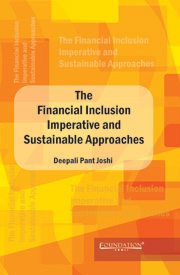Book contents
- Frontmatter
- Contents
- Foreword
- Acknowledgment
- 1 An Overview on Development
- 2 Financial Inclusion: The Nature and Extent of the Challenge
- 3 Financial Inclusion: The Indian Perspective
- 4 Tackling Financial Inclusion and RBI Policy: Responses and Voluntary Initiatives of Banks
- 5 Microfinance Experience and Other Institutional Approaches
- 6 Policy Response Committee on Financial Inclusion
- 7 International Experience in Promoting Financial Inclusion and Policy Responses
- 8 The Way Forward – Determinants and Macro Policies
- Appendix
- Bibliography
- Index
7 - International Experience in Promoting Financial Inclusion and Policy Responses
Published online by Cambridge University Press: 05 June 2012
- Frontmatter
- Contents
- Foreword
- Acknowledgment
- 1 An Overview on Development
- 2 Financial Inclusion: The Nature and Extent of the Challenge
- 3 Financial Inclusion: The Indian Perspective
- 4 Tackling Financial Inclusion and RBI Policy: Responses and Voluntary Initiatives of Banks
- 5 Microfinance Experience and Other Institutional Approaches
- 6 Policy Response Committee on Financial Inclusion
- 7 International Experience in Promoting Financial Inclusion and Policy Responses
- 8 The Way Forward – Determinants and Macro Policies
- Appendix
- Bibliography
- Index
Summary
In developed countries, there is a greater awareness of the positive role financial inclusion can play in empowering the low income groups. Official policies in these countries actively promote inclusive practices, going as far as to give them statutory sanction. In UK, a dedicated fund has been set up to encourage inclusion, and banks and credit unions have been assigned definite responsibilities. In the US, the Community Reinvestment Act prohibits discrimination by banks against low- and moderate-income groups, while in France, it is a legal right for anyone to have a bank account. Clearly, there is much to learn both from international developments and from the experience gained within the country during the first two decades after bank nationalisation.
A Goal Relevant to All Economies
Building inclusive financial systems and allowing access to them is a goal that is relevant to economies at all levels of development. The primary objective lies in making financial systems available to all and ensuring that as many people as possible enjoy access to the financial system, thereby tapping the full potential of the economy. Attention needs to be devoted to enhancing the quality, reach and range of financial services and products credit, savings, insurance payment systems for sustained growth and productivity. It is axiomatic that well-functioning financial systems boost economic growth which reduces poverty. Financial market imperfections as high transaction costs flowing from asymmetry of information are addressed by wellfunctioning financial systems. All countries need to improve financial access.
- Type
- Chapter
- Information
- The Financial Inclusion Imperative and Sustainable Approaches , pp. 204 - 215Publisher: Foundation BooksPrint publication year: 2011



